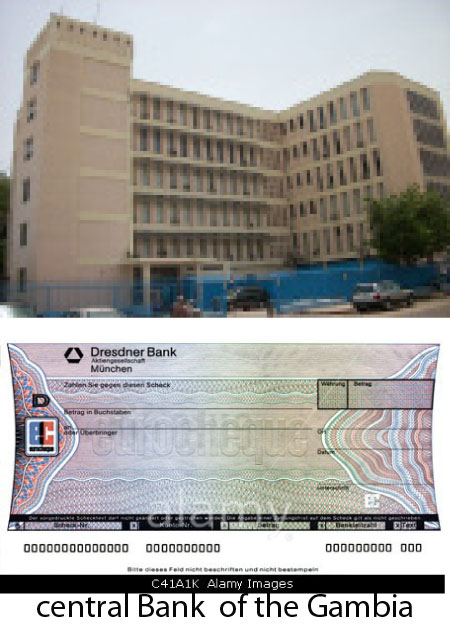
The darkest hour comes just before the dawn, they say. And in The Gambia it seems the darkest days, when bank clients would have to wait for a long period, (about four to five days) before they could receive money for their cheques submitted to banks for cash, would today (August 1) give way to the era of the electronic clearing house system, if the recent press release by the Central Bank of The Gambia is anything to go by.
The electronic clearing house creates facility for a cheque to be matured and cashed in one day and permits business to operate without much hindrance in terms of liquidity and cash flow.
Previously the Central Bank of The Gambia (CBG) was operating under the Manual Clearing House system, which means banks and their clients would have to wait for days for their cheques to be matured, processed or settled manually or physically before they can be cashed, which was quite frustrating, time consuming and business retarding.
Today all that is expected to cease as the Central Bank of The Gambia, the bank of banks in the country, would henceforth start to operate an electronic clearing house, to effectively bring into fruition the successful launch of the three payment systems: the Automated Cheque Processing/Automated Cheque Clearing (ACP/ACH), Real-Time Gross Settlement System (RTGS) and the imminent launching of the Security Settlement System (SSS), in line with the modernization of the country’s payments, clearing and settlement system infrastructure.
These payments systems – the ACP/ACH, the RTGS and the SSS – are a set of instruments, procedures and rules for the transfer of funds among system participants (i.e. bank to bank, which actually comes from cheques received from bank clients and customers).
These payments systems make it possible and easier for a central bank electronic clearing house to be operational, instead of a manual clearing house as has been the case in The Gambia over the years.
A clearing house is any institution that settles mutual indebtedness between a number of organizations. The UK banks, through the Association of Payment Clearing Services, have: Bankers Automated Clearing System (BACS), which provides interbank clearing; Clearing House Automated Payments System (CHAPS), which now provides instant clearing for electronic transfers through the Real Time Gross Settlement System (RTGS), and EFTPOS for electronic funds transfer at point of sale.
There are similar institutions in other countries, e.g. the Clearing House Interbank Payment System (CHIPS) in New York.
There is also a global system for settling payments that flow through the foreign exchange markets, i.e. CLS services set up by the large banks.
The new system will, among other things, help the Central Bank to eliminate or minimize risks associated with payments, clearing and settlement system; eliminate float size of individual consumers and banks as well as significantly reduce the float time for cheques with the possibility of reducing cheque clearance time from five days to one day in addition to combating fraud and forgery; and pave way for reducing high cash intensity and gradual migration to help usage of electronic modes of payments.
All the banks licensed by the Central Bank of The Gambia are mandatory participants of the new system and are members of the Gambia Clearing House.
To enable the smooth function of the electronic clearing house system, commercial banks in the country were directed to issue Magnetic Ink Character Recognition-compliant cheques to their customers prior to the launch of the systems in December 2011, and by now it is expected that banks should have done so to let their clients be up to speed with the new system.
This means that all cheques that are printed without the Magnetic Ink Character Recognition (MICR) codeline will not be cleared, as the Banjul Manual Clearing House ceases to operate today, if the August 1 timeline set by the Central Bank of The Gambia is adhered to.
A recent release by the CBG stated that the automated electronic payment and clearing system (ACP/ACH) for cheques and direct credit remittances creates an efficient payment and clearing system for fund transfer.
The general public is also being informed that cheques bearing values above the D100, 000 (One Hundred Thousand Dalasi) Maximum threshold for the ACP/ACH cannot be presented for inter-bank clearing through the Automated Clearing House irrespective of whether or not such cheques are MICR-compliant. “This requirement has no effect on cheques presented over the counter by the drawee at the drawer bank for cash payment,” the CBG says, adding that payments with values exceeding D100,000 should be made through the Real-Time Gross Settlement System which is accessible by every participant bank.
It is also worthy of note that the CBG has reduced its rediscount or interest rate by 1 percentage point to 12 points from the 13 it used be three months or so ago. This is a step in helping business growth and expansion in the country, because The Gambia has been tagged as one of the nations with the highest interest rates charged for loans to bank customers.
Businesses in The Gambia are finding it very difficult to pay the high interest rates charged for loans, as it continues to hinder their organic growth and expansion, contrary to what loans are really meant to achieve.
The network of taxes businesses are compelled to pay to government is also a cause for concern, although it is understood that some reforms in this regard are being instituted by government, which is good, and this should be carried out to encourage investors and spur the growth of investment and trade in the country.



